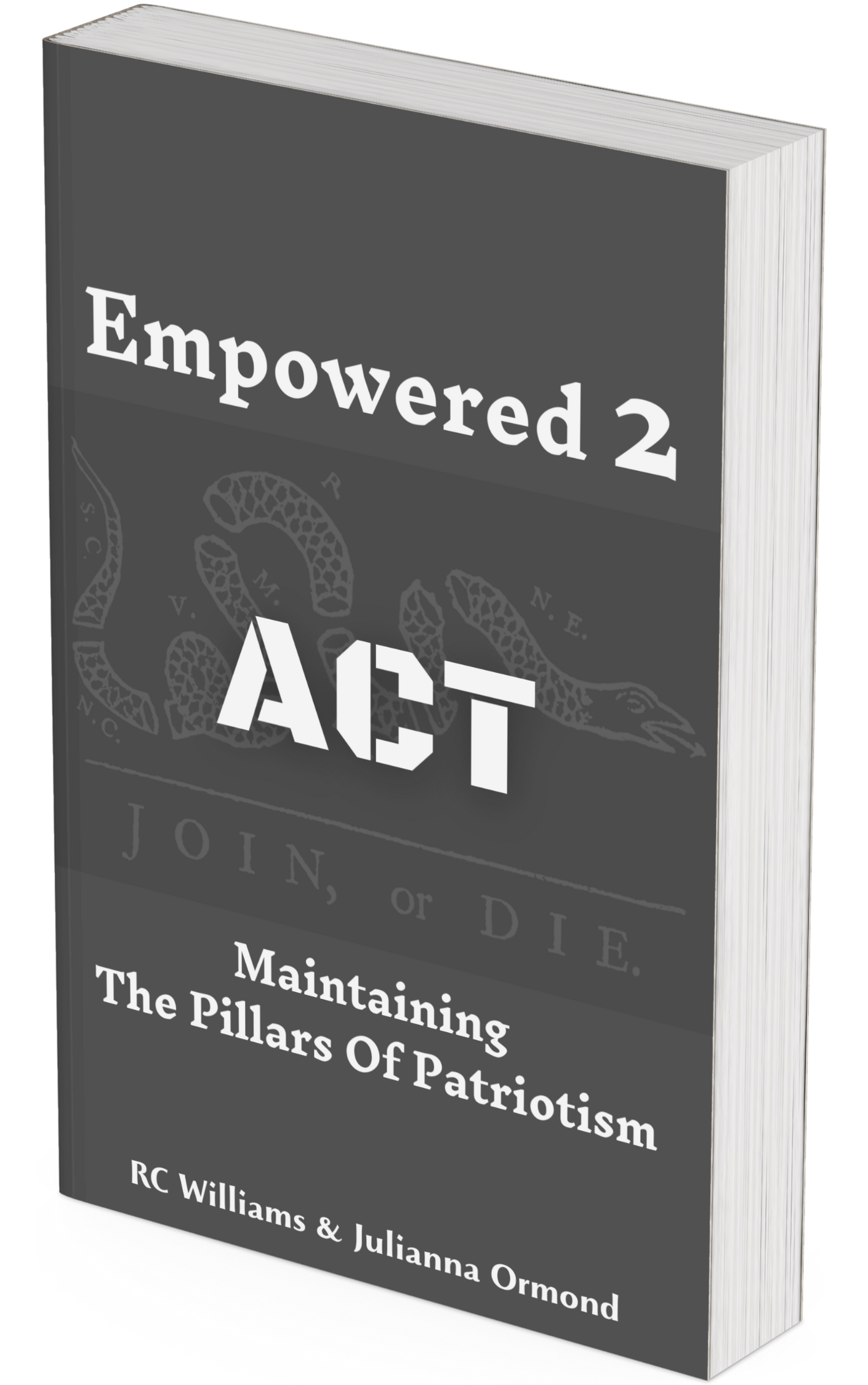Ripped From The Headlines: Independence Day Special
Today, We Take A Look Back At How The United States Of America Was Born - Read, Share, & Subscribe - SherlocExposes.com
Get the new e-book from Ripped From The Headlines publishers RC Williams & Julianna Ormond, entitled “Empowered 2 ACT: Maintaining The Pillars Of Patriotism.”
In the rapidly evolving landscape of the 21st century where the currents of change often erode the bedrock of our societal values, the call for patriotic activism rings out with renewed urgency.
"Empowered 2 ACT: Maintaining The Pillars of Patriotism," is not merely a response to this call—it is a clarion call of its own, a manifesto for those who stand on the front lines in defense of liberty, tradition, and the enduring principles that constitute the foundation of our society.
Editor’s Note: Ripped From The Headlines Will Be Back On July 8th, 2024.
How We Got Here: A Look Back At 248 Years Of Independence
The Road to Independence: A Journey Steeped in Faith and Freedom
As we celebrate the birth of our nation this Independence Day, it's essential to reflect on the profound journey that led to the colonies declaring independence, the pivotal day that marked our freedom, and the events that shaped our nascent republic between the end of the War for Independence and George Washington's inauguration as our first President.
The Foundations of Liberty
The journey to independence was not a sudden upheaval but a gradual awakening rooted in the colonists' desire for liberty, self-governance, and religious freedom. The seeds of discontent were sown in the aftermath of the French and Indian War (1754-1763). The British Crown, burdened by war debt, imposed a series of taxes and laws upon the colonies, such as the Stamp Act of 1765 and the Townshend Acts of 1767, without their consent. This led to a growing belief among the colonists that their God-given rights were being trampled upon.
The Boston Massacre of 1770 and the Boston Tea Party of 1773 were pivotal events that galvanized colonial resistance. The Intolerable Acts of 1774, which were punitive measures by the British, further united the colonies in their quest for self-determination. The First Continental Congress met in 1774, a significant step towards unified action against British tyranny.
The writings and sermons of influential leaders, often infused with Christian values, underscored the belief that liberty was a divine right. Figures like Samuel Adams and Patrick Henry were not just political leaders but men of deep faith who believed that freedom and self-determination were inalienable rights granted by God.
The slogan "No taxation without representation" became a rallying cry, echoing the sentiment that true government derives its powers from the consent of the governed, a principle enshrined in the Declaration of Independence.
The Declaration of Independence: A Bold Proclamation
On July 4, 1776, the Continental Congress adopted the Declaration of Independence, which eloquently articulated the colonies' grievances and their right to self-governance. Authored primarily by Thomas Jefferson, the Declaration begins with a profound assertion of individual rights:
"We hold these truths to be self-evident, that all men are created equal, that they are endowed by their Creator with certain unalienable Rights, that among these are Life, Liberty and the pursuit of Happiness."
This statement was not merely a political declaration but a theological one, asserting that rights come from God, not from government. It set forth a vision of a nation where liberty and justice, grounded in a moral and spiritual framework, were paramount.
The declaration was a radical assertion of the colonies' right to break free from British rule. It listed grievances against King George III, including imposing taxes without consent, dissolving representative houses, and maintaining standing armies in peacetime without the consent of the legislature. These grievances underscored the colonists' belief that their rights as Englishmen were being systematically violated.
The War for Independence: A Struggle for Survival
The Revolutionary War, which began in 1775, was a brutal and protracted conflict. The early years were marked by significant hardships, including defeats at battles such as Bunker Hill and the loss of New York City. However, the Continental Army, under the leadership of General George Washington, showed remarkable resilience.
The turning point came with the victory at the Battle of Saratoga in 1777, which convinced France to enter the war on the side of the colonies. French military and financial support was crucial to the eventual American victory. The war culminated in the British surrender at Yorktown in 1781, effectively ending major hostilities.
From War to Governance: The Struggle for Stability
The end of the Revolutionary War in 1783 marked a triumphant moment, but it was also the beginning of a challenging journey toward stable governance. The Articles of Confederation, adopted in 1781, proved inadequate for managing the new nation’s diverse needs and interests. The fledgling country faced economic turmoil, interstate conflicts, and a weak central government.
Recognizing the need for a stronger framework, the Constitutional Convention was convened in 1787. Guided by divine Providence and a commitment to create a lasting republic, the framers drafted the Constitution. This new document established a balanced government with checks and balances, ensuring that no single branch would dominate. It also incorporated the Bill of Rights, explicitly protecting individual freedoms such as speech, religion, and the right to bear arms.
The Federalist Papers, a series of essays written by Alexander Hamilton, James Madison, and John Jay, were instrumental in promoting the ratification of the Constitution. These essays articulated the necessity of a strong central government while also addressing concerns about potential abuses of power.
The Inauguration of George Washington: A New Era
On April 30, 1789, George Washington took the oath of office as the first President of the United States. His inauguration symbolized the triumph of the American experiment in self-governance. Washington, a man of deep faith and integrity, set a precedent for leadership characterized by humility, service, and dedication to the principles enshrined in the Constitution.
Washington's presidency was marked by his efforts to unify the nation, establish a functioning federal government, and uphold the rule of law. His Farewell Address, delivered in 1796, warned against the dangers of political factions and foreign alliances, emphasizing the importance of national unity and moral integrity.
A Legacy of Faith and Freedom
As we commemorate Independence Day, let us remember the profound faith and unwavering determination of our Founding Fathers. Their commitment to liberty, guided by their belief in divine providence, laid the foundation for the greatest experiment in self-governance the world has ever known. The principles they enshrined in the Declaration of Independence and the Constitution continue to guide us today, reminding us that true freedom is rooted in our God-given rights and responsibilities.
May we honor their legacy by upholding these principles, ensuring that our nation remains a beacon of liberty, justice, and faith for generations to come.
Happy Independence Day!
Please support our sponsor, EMP Shield!
Did you realize that even something like a solar flare can knock out your electronics? Or kill your car?
Yes, you could be partying like it’s 1859 in the snap of a finger…
Yikes.
Best to be protected right? But what to do?
Our friends at EMP Shield have it figured out. These guys are brilliant. They have EMP Shields for your car, home, and generator.
And it costs way less than you think.
Check them out today - click the link and save $50 on us.
Your future depends on it.
James Wesley, Rawles, publisher of SurvivalBlog.com has put together a “bookshelf” list of key things you should have. CLICK HERE to access the list.
Plus a recap of the 50 things you should have handy to barter.
Share this email with everyone you know. Sign up for a free or paid subscription. Paid members will receive our in-depth solutions.
Ripped From The Headlines is your daily digest of what’s happening in the world. We help you to understand what it means, why you should care, and what you should do.
Have a tip on a story, case, or issue that needs to be covered? Email us: info@investinanswers.com. Confidentially assured.






